Heavy: The pros and the cons
I watch a lot of A&E, (take from that what you will) so I got an eyeful of previews for their new show called “Heavy.” Maybe you have heard of it, but in case you haven’t, it follows two extreme deathfats through a weight loss program.
Not exactly revolutionary, but I watched it anyway, while waiting for Intervention to come on.
Here are my impressions:
Believe it or not, at least in my humble opinion, it stands head and shoulders above The Biggest Loser. For one, the trainers are actually human. They actually seem to enjoy the individual personalities and care about them as people. They are treated at least somewhat decently rather than outright abused like they are on TBL. The trainers actually encourage them and acknowledge their successes. I liked seeing the fat patients discuss their stresses and traumas with therapists because, even though the emotionally unstable fattie is an old tired cliche, compulsive overeating and its triggers are all very real, and can occur in people of all sizes.
The cons, however, outweigh the pros, which is to be expected in a program like this.
The fatal flaw of this, and most other programs similar in nature, is the reliance on cliches. The most extreme examples of obesity, health impairment, and limited mobility are paraded around to represent obesity as experienced by the typical American. Because shows about people that look like me, or like the small-fats that compose most of the obese population, don’t carry the same urgency.
Not that death fats are too fat for fat acceptance and need to lose weight for their health. I just mean that, on top of the dubious connection between weight and health, most fats aren’t even that Fat.
The emotionally unstable fatty is another, increasingly common, cliche. What bothers me about that one in particular is that, allegedly, the point is to make fat people seem more human. In reality, they just look more clownish. I can’t help but think there is a hidden agenda there, which is to feed the perception that fat people are childish and morally defective. Fat people gorging on sweets is a media favorite because sweets and a lack of self-control are associated with children. Coping mechanisms, like overeating, connote a childish inability to cope with the stresses of life. Whenever a fat person cries or complains on TV, the person’s pain is minimized while the outburst itself is made to seem as much as possible like a young child’s tantrum. They cry, yell, shake their fists, stamp their feet, etc. just as a child would at the slightest provocation, or so we are led to believe. The idea is to convince the rest of us normal people that fat people just cannot be taken seriously.
One of these days, I would like to see a show teaching HAES and, if there are any compulsive overeaters, I want at least one of them to be thin, because thin people CAN be compulsive overeaters and really suffer from that condition. Likewise, I want portrayals of anorexia and bulimia to include normal-weight and fat people.
So, in all, Heavy is not a winner by any means. It will require a hefty supply of Sanity Watchers’ points. On the other hand, it won’t completely destroy you if you choose to watch it while waiting for something better.




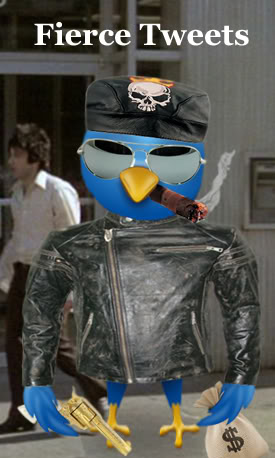



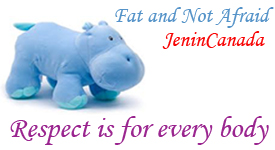

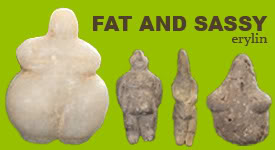
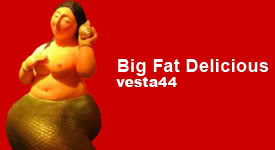




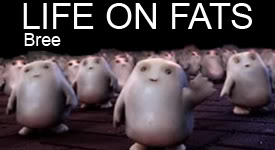
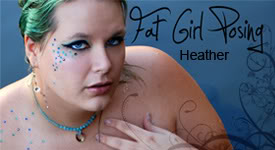


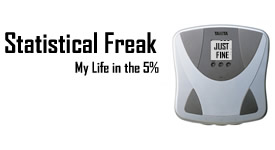
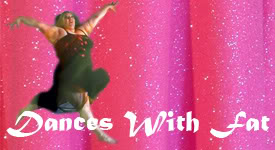

I watch lots of A&E too and am ALWAYS seeing commercials for that. I always just roll my eyes and fast forward. Some fatties do have health and mobility issues and some would like to lose weight and that’s fine because (bust out your highlighters, this is important) it’s their body and they can choose to do what they want with it! I hate the side-show-esque feel of such shows and my family won’t watch them with me because I get hella snarky. You’re brave for watching! I’m totally not in the right place to do that. I’m a very angry fatty. Haha!
There couldn’t be a show like you propose because it doesn’t make for good television. Nobody wants to watch people just living their lives — not enough drama. It’s why I positively loathe reality tv of any nature (and Heavy, Intervention, The Biggest Loser etc all qualify) — people tune in to watch *something happen*. And on reality TV that something is someone else’s life being shredded, belittled, and generally shot to hell in the name of ratings or money or moral outrage.
I wish there were more shows on that had at best the same relationship with reality that Law and Order, CSI, etc all have. Which is to say not a whole hell of a lot. That way when someone’s life is being utterly and completely ruined for entertainments sake, nobody real is actually getting hurt.
“There couldn’t be a show like you propose because it doesn’t make for good television. Nobody wants to watch people just living their lives — not enough drama. It’s why I positively loathe reality tv of any nature (and Heavy, Intervention, The Biggest Loser etc all qualify) — people tune in to watch *something happen*. And on reality TV that something is someone else’s life being shredded, belittled, and generally shot to hell in the name of ratings or money or moral outrage.”
Sorry, but I fail to see how Intervention qualifies as a TV series that belittles and destroys people. Chemical dependency is a real problem for which effective treatment is available, unlike obesity. Addicts agree to have their words and behavior filmed with the exception of the intervention itself, and they can still request that parts of it occur off camera. In every episode I’ve seen, the producers emphasize the importance of understanding what brought on the addiction and on pointing out the good qualities, accomplishments, and the potential of the addict. They certainly are not abused by the producers or the interventionist. Their behavior and attitudes are often criticized, sometimes harshly, but that is not the same as abusing or demeaning that person. As such, I object to your characterization of Intervention and your comparing it to shows like The Biggest Loser or even Heavy.
I also beg to differ with your assertion that fictional drama is no big deal. People absolutely can be exploited and psychologically damaged by being cast in certain roles. Actual, specific people and events don’t need to be depicted literally in order to be depicted symbolically and thus exploited or disrespected for the sake of entertainment. Parents of Murdered Children in particular is running a campaign against shows like CSI because they feel they exploit murder victims and their families for the sake of entertainment. I don’t agree with that assessment myself, but it obviously doesn’t matter to them that no actual murders were depicted.
Sorry, I forgot to add that I have my own criticisms of Intervention. For example, I feel that they spend too much time on the troubled childhood theme and not enough on the cultural context of addiction. So it’s not that the series can’t stand some criticism. I just don’t share yours.
The show may intend to be everything you say. But thats not why most people watch it. They watch it for the train wrecks.
I am a heavy person (270 pounds) who has certifiable mental health issues (bipolar disorder, borderline personality disorder, OCD) and it is very rare for me to “throw fits.” I generally do not cry in front of people and if I do, it’s very subtle. Anyone can be driven to “throwing a fit” if they are needled at enough.
As a person in the medical field, I can say that there is a difference between true morbid obesity and being fat. I mostly work with the elderly. The “death fat diseases” like hypertension, heart disease, and type II diabetes effect elderly people of all weights EQUALLY! The difference that I have observed is that heavy people tend to have more trouble with osteoarthritis in the joints of the loser body (knees, hips, ankles) while very slender people tend to develop osteoporosis. It’s kind of six of one half dozen of the other. The extra weight provides weight bearing resistance, which is why one doesn’t tend to see heavy people with osteoporosis. But it puts more stress on the lower joints.
While doing clinicals at the hospital I took care of three people who were truly morbidly obese. It impacted their ability to move. I will tell you that all three of these people had kidney problems. So, how much of the obesity was due to complications from the kidney problems? I don’t have the training to say.
Even the large adult blood pressure cuffs did not fit these folks, the smallest of whom weighed 350 pounds. I had to use the cuff around the lower part of the arm. Perhaps this means that a third size of BP cuff needs to be developed. This woman, who was 30 years old, was able to help in her care and was able to transfer to her wheel chair with stand by assist.
The next was an older woman who probably weighed around 450 pounds. Until her condition suddenly worsened, she too was able to move with stand by assist. She was fairly tall so her weight was more evenly distributed. We also had a patient of around 450 pounds who was short. She was barely able to move and was non-verbal. There were folds of fat around her ankles that had become infected by fungus because she couldn’t reach them to clean herself. This woman hardly spoke. I’m not sure if there was true dementia or if she was simply so depressed that she had become non-verbal.
Is being that heavy a health issue. I would say yes. But did these people become that heavy because of other health problems? Possibly. Again, I don’t have the training to say for sure. One thing I do no for sure is that SHAMING these people for their size would not help any of them, and putting people on crash diets is never, ever, ever the answer.
Most heavy people are able to move and you know what? I can think of no “lazy” fat people who aren’t also depressed. Depression causes inertia. The myth of the “lazy lard ass” is just that-a myth.
I would love to see a program that taught Health At Every Size as opposed to fixating on a number on a scale. Also one that taught self-acceptance. But yeah, that wouldn’t make for “good TV.” Actually, it would. It just wouldn’t make for good voyeurism.
Erin and Blooming Psycho are right, HAES is too moderate for television. But it would be educational.
I hate the psychological cliche too. Not everyone who is fat is an emotional eater. Not everyone who overeats is an emotional eater. Yet we hear that the overwhelming majority are. I even saw a site that claimed 95% of people are emotional eaters.
And I agree with you about infantalizing fat people. It’s like they want us to seem completely helpless in our bodies and in need of The Biggest Loser to save us from ourselves. It’s totally degrading.
Thanks for sharing your insights and killing any interest in this show.
Peace,
Shannon
I’m going to have to come out and admit I become terrified when I watch Hoarders, Intervention & Paranormal State. There is nothing worse than spending hours looking for signs of addiction, too many junk piles and angry ghosts.
That said, there have been a lot of people talking about Heavy in a variety of ways. They range from outright fury to fascination.
I suppose only time will tell if it sticks around, but I’m not inclined to become a regular viewer. A & E usually gets decent marks in my book.
Let me begin this post by saying that I’m a chef and a lifelong foodie. I just want to say yeah! for emotional eating. What on earth is this crazy person speaking of, you may ask. Life is just freaking full of ups and downs. we can deal with them all kinds of ways but for most people eating a good meal can be the closest to feeling at home as one can get. Getting together for the holidays with family and friends is a great way to emotionally eat. Researching and preparing a meal that reminds my lover of the counrty he hails from is great emotional eating. Binge eating for emotional reasons is a different story entirely. Watching the look on my customer’s faces when they bite into something I’ve made because I love to feed them. That’s bliss for me. So yeah! for emotional eating